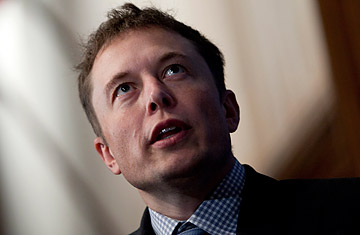
Elon Musk, chief executive officer of Space Exploration Technologies Corp. (SpaceX) and Tesla Motors Inc., speaks at the National Press Club in Washington, D.C., U.S., on Thursday, Sept. 29, 2011. Musk said SpaceX is developing a reusable rocket.
(5 of 6)
"The number of major events that have to go right for a crew to survive an emergency on the Dragon is about half as many as with the shuttle," says Reisman.
The simplicity extends to SpaceX's policy on outsourcing--or the relative absence of it. The company keeps 80% of its manufacturing in-house, leaning on subcontractors only when absolutely necessary. That's something NASA can't do--not with 100 Senators and 435 Representatives clamoring for a slice of space pork to take home to their constituents. Scattering bits of work all over the country is a great way to make a project unkillable but a terrible way to make it cost-effective. "The bureaucracy here is different," says Tom Mueller, SpaceX's director of propulsion systems. "If you want to change something or fix something, just talk to Elon. It keeps the signal-to-noise ratio high."
In the Pipeline
Dragon's next flight, another iss resupply mission, is scheduled for this fall and will be launched on another Falcon 9. The Falcon Heavy could fly as early as next year. That would increase the amount of hardware SpaceX can put into low Earth orbit from a respectable 23,000 lb. to a whopping 117,000 lb. Also close to emerging from the pipeline is the crew-rated version of the Dragon.
After the Dragon's first flight, in 2010, Musk took some heat for declaring, "If there had been people sitting in Dragon today, they would have had a nice ride." That was something of an overstatement, considering the spacecraft had (and still has) no seats, instrument panel, crew-rated air-pressure system or carbon dioxide scrubbers. But all of that is in the works. The goal is to be ready to fly a crew in 2014.
Should that come off as planned, Musk will offer his people-carrying services not just to NASA but to other countries too, barring national-security issues. He'd also like to claim some of the business NASA has been losing in recent years. Russia charged the U.S. upwards of $50 million per seat to launch American astronauts to the ISS; once the shuttles stood down, a price hike was announced, to nearly $63 million. "We can repatriate some of that money," says Musk.
He'd be happy to carry private citizens as well and is careful not to disparage the efforts of Branson and the like, since customers who get a taste of suborbital flight and enjoy it may re-up for an orbital trip with SpaceX. Ultimately, Musk would like to be able to get people to and from Mars for about $500,000 per seat. No one, however, should expect to see the SpaceX chief himself going aloft anytime soon. "I would like to go to space, but I have to forgo that," Musk says, citing the five sons and three companies he must look after. "I have to be careful with personal risks."
